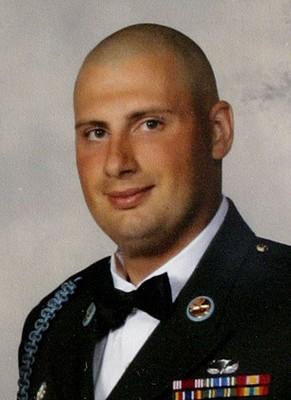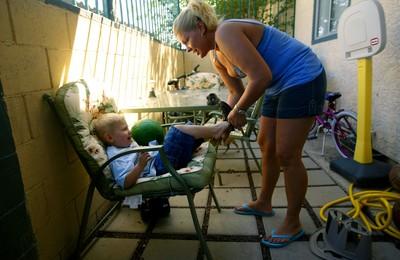Iraq deployment changed soldier


When Army Spc. John Shoup came home on leave two months ago after serving seven months in Iraq, he wasn’t the same man his wife, Lori, had known since they married four years ago.
“We noticed he was very different,” Lori Shoup said Monday, sitting on the porch of their Las Vegas condominium not far from where fighter jets take off from Nellis Air Force Base.
“I noticed in the first week he wasn’t sleeping,” she said. “He started to get a little snappy and stuff. … He told me he didn’t want to talk about it.”
Before his two-week leave was over, the nightmares and the horrifying memories of the so-called Triangle of Death in south Baghdad had set in.
“He started crying and started throwing things,” she said about her 26-year-old husband from Frackville, Pa.
Little by little, though, the things he didn’t want to talk about came to light. Among them were the four roadside bomb attacks that he survived but left some of his buddies wounded.
But the worst, she said, were the times he was called to bag up body parts of dead soldiers who had been blown up by improvised explosive devices on patrols ahead of his platoon, a mortar troop of the 1st Squadron, 89th Cavalry Regiment from the 10th Mountain Division out of Fort Drum, N.Y.
With her husband displaying the classic symptoms of PTSD, or post-traumatic stress disorder, she checked him into a privately owned psychiatric hospital where he was treated for major depression related to PTSD.
He was given anti-depressants and while he was there, she said, his first sergeant called to inform him he would be listed as absent without leave and his paycheck for May would be canceled if he didn’t report back to his squadron in Iraq, one of many regular Army units whose tours had been extended.
Lori Shoup said her husband told the first sergeant about his bout with PTSD. The sergeant’s response to him, she said, was: ‘How’s that different from the way you normally act?’ That really upset him. It was as if they didn’t care.”
With his mental problems persisting, John Shoup met with doctors at O’Callaghan Federal Hospital at Nellis Air Force Base. Doctors there tried to help him, but on April 16, the day before he was supposed to return to Fort Drum, his condition took a turn for the worse. While at home, he took too many drugs in what he described as a suicide attempt, and Lori had to rush him back to the Nellis hospital. His stomach was pumped and he was put in supervised care.
In the meantime, Lori has been struggling to make ends meet by continuing to work as a bartender at a cantina on the Strip while caring for their 3-year-old son, Levan, and her 8-year-old daughter, Emily, from a previous marriage.
“I’m at wit’s end,” she said. “There’s no way I can do it all by myself.”
Her father, Joseph Godlewski, a retired Army staff sergeant, has been trying to help with babysitting. He is also helping his daughter understand what John is trying to endure.
“The poor kid has seen so much death,” he said. “Once the smell of death is in your nose it never goes away.”
For Lori, the gravity of the situation became too much last week, when she experienced a nervous breakdown that resulted in a trip to the Nellis hospital emergency room.
Now back at home, she was feeling better Monday even though she learned that John’s status with his overseas unit had officially changed to AWOL while he’s still at the federal hospital. His paycheck had not been deposited.
“I couldn’t believe it. My heart went right down into my stomach,” she said.
In a telephone interview from his hospital room, John Shoup said he had served his four-year obligation but his orders had been extended.
He said his first sergeant had called him to say he had “better hurry up and stop fooling around and get back to Iraq.”
“All we do is drive around and wait to get blown up,” he said. “I just want to get back to the Army and get out and get back to my family.”
On Tuesday, a spokesman at Fort Drum acknowledged that John Shoup had called the fort to say he needed mental help. They directed him to the Nellis hospital to continue PTSD treatment until he was well enough to return to Fort Drum.
“Then they would make a determination if his future is best not serving in the Army,” Fort Drum spokesman Ben Abel said.
Given the current circumstances, Abel said he could not foresee the Army sending him back to Iraq.
As for stopping his pay, that was a misunderstanding that stemmed from his overseas unit, Abel said, noting, “It’s on its way to being cleared up.”
Lori Shoup said, however, that her husband won’t be returning to Fort Drum immediately. Instead, he will be transferred today from the Nellis hospital to Walter Reed Army Medical Center in Washington, D.C.
In the meantime, she wants to see “all of our boys come home” from Iraq.
“I believe our job is done there. … I believe that our troops are doing a lot of good there. I back our soldiers 100 percent. I’ve heard it referred to as a modern-day Vietnam.
“It’s getting uglier and uglier. It’s really unfortunate because our society is going to suffer from it because there’s a lot of fathers and sons and brothers who will never return. And some will never return the same people they were when they left.”
Operation IraqiFreedomA
special package of news updates, local coverage, multimedia and
more.













